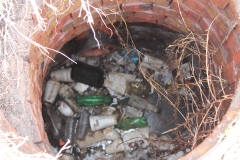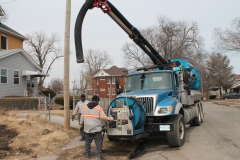“This is not a new bill, but a cost that was previously included in your Illinois American Water bill,” reads the “Important Notice for the City of East St. Louis Sewer Users”. But this sentence could not be further from the truth for this struggling once proud All-American City that boasted of of a diverse population of nearly 80,000 black and white citizens back in 1960 to approximately 27,000 black residents today. “Our city’s sewer system will be 153 years old next month” said Mayor Alvin Parks. Parks is half way through his second term as mayor for the city that has a proud history of being the home of legendary giants like Miles Davis, Jackie Joyner-Kersee, Eric Wright, Dawn Harper, former United nation Ambassador Donald McHenry and others. The invoice is mailed using the official seal of the City of East St. Louis, Illinois but goes to Tulsa, OK where payments are sent. The invoice is well drafted and is full of explanatory statements, one which highlights the new legislation, passed by the mayor and three of the four aldermen (one alderman was absent) on September 25, 2012. The legislation, City Ordinance # 12-10097, has resulted in increasing the revenue of $89,000 back in 2011 to a projected revenue of $500,000 for the yer 2014. The city’s annual budget reflect that more than $300,000 was collected in 2013. A referendum was never voted upon by the citizens and the mayor supports the decision made by the “elected officers” not to seek out the will of the voters.
The statement citing the new city ordinance failed to inform the residents that three key areas of billing have been increased. The user rate charge is the current flat rate billed by the city for water usage per 1,000 gallons. This rate was $.1875 per 1,000 gallons used prior to October 2012 but was increased to $.30 cents per 1,000 gallon and later in October 2013 increased to $.60 cents per 1,000 gallon. Effective October 2014 the set rate of $1.00 per 1,000 gallon will be charged. A sewer maintenance fee, is the flat monthly rate residents are charged for “sewer maintenance services.” The rate had been $.50 per month prior to October 2012 and was increased to $5.00 per month in October 2012 and subsequently increased to $7.50 in October 2013. A final set monthly rate $10.00 will take effect in October 2014. A flat monthly “service charge” of $1.50 has been imposed on all residents.
The City of Centreville, the Common Fields of Cahokia Water Company and the downsized Pfizer Company and other businesses in East St. Louis also have experienced similar increases in the three areas of payment since the entities tie into and used East St. Louis sewer system trunk lines. American Bottoms and the Metro East Sanitary District, both facilities that provided preliminary, primary and secondary treatment for wastewater from the city are not included in fee assessments even though the treatment occurs only after the wastewater is transported to their respective sites by use of the city’s sewer system. American Bottoms was the first entity that was successful in collecting revenues from East St. Louis residents that frequently involved court actions and liens against property owners. “We will be billing them, (American Bottoms and Metro East) once a formula has been arrived at for such billing” Parks said after being asked why the treatment facilities were not including in the ordinance. The invoice encourages city residents to pay their monthly wastewater treatment bills as well.
The sewer user rates and maintenance fees charged and collected by the City of East St. Louis are deposited into a special and restricted fund (Enterprise Fund) dedicated and limited to the administration, operation, maintenance, and repair of the City’s sewer system according to the ordinance as passed back in September 2012. Billing and collection as referred to earlier are actually a part of a third-party billing by a nationally known company that specializes in municipal utility billing based in Tulsa, OK. Payment transactions all electronically done by check only via the city’s secure check conversion program.
Mayor Parks cited his commitment to the “safety and welfare” of his citizens dating back when he was first elected as a city alderman as one of the reasons why a referendum was not pursued. “Residents complained about sewer back up into their homes which is a danger to residents and is unsanitary.” stated the Mayor. “We have been able to purchase a used vacuum truck for $150,000 and repair two pumping stations” Parks said due to the increase in revenues. Reportedly the Illinois Environmental Protection Agency has cited to need for major infrastructure improvements to the city’s aged combination sewer and storm system years ago but federal and state funds like the city’s revenue has been limited. “The current sewer system is in danger of collapse and may cause imminent danger to residents” reads the project justification statement for several Capital Improvement Programs.
A homeowner’s sewer water bill will increase between $15 and more as the new rates take effect. Trash frequently observed in the streets can eventually enter the combination sewer-storm system and lead to sewage backup in homes and major flooding during a flash rain. “It looks like a candy store down there” said one city employee operating the city’s new “used” vacuum truck. The sewer had no open access yet it had bottles, paper, plastic and other discarded items that had collected in the sewer from more than one block away.


